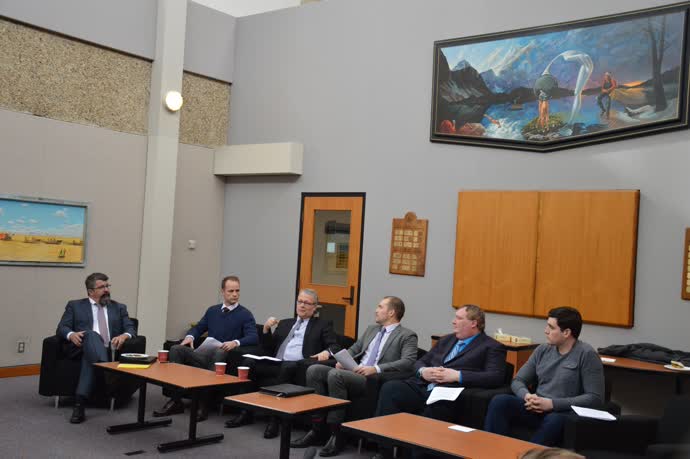
What does religion have to do with being a lawyer? If you were to ask Robert Mendenhall, Michael Pucylo, and Jeremy Taitinger, the answer would be "a lot."
The three lawyers gathered at the Law Centre on March 14 for Religious Lawyering: A Conversation, a panel discussion hosted by Dean Paton intended to explore the relationship between practicing law and one's personal faith, through the lens of professional responsibility.
Two UAlberta Law students - Benjamin Ferland from Christian Legal Fellowship and Dan England from the J. Reuben Clark Law Society - asked questions of the panel in front of a standing-room only audience in CN Alumni Hall made up of students, faculty, and members of the Edmonton bar.
The first question asked the panellists for their views on separating faith from the practice of law.
"I don't try to separate what I do at work with what I do at home," said Robert Mendenhall, Vice-President, Tax & Estate Planning at Richardson GMP and the President of the Edmonton Bonnie Doon Stake of The Church of Jesus Christ of Latter-day Saints, of staying true to his identity in all areas of his life.
Michael Pucylo, a partner at Miller Thomson and a permanent deacon in the Roman Catholic Church, added that he has acted for clients of many different religious backgrounds, with some even praying in his office.
The panel was asked how open they are revealing their religion at work, and whether their faith has impacted relationships with colleagues.
Jeremy Taitinger, a partner at Reynolds Mirth Richards and Farmer who also teaches Construction Law at UAlberta Law, said that he freely identifies as a Christian at work, and that his firm has a diverse range of employees.
"Some of the best discussions I've had have been with partners on issues we've adamantly disagreed on," he said.
Mendenhall added that he is open with his faith at work, and advised the audience to focus on choosing how they want to live, instead of how they earn their money.
As the informal conversation neared its end, panellists were asked about how their faith informs finding an appropriate balance between obligations to their firm and clients and obligations to family, friends, and communities.
Mendenhall joked that their spouses and children should be present to say how well they've done at balancing everything.
Taitinger noted the importance of being focused and productive at work, so time remains for other important activities, such as spending time with family, and volunteer / pro bono work.
Pucylo spoke about the importance of looking at priorities in life and deciding where each one falls.
"It's important that you don't lose your faith because you're practicing law," he said. "Ultimately, faith is the most important thing you have."